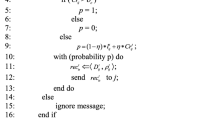Abstract
The trustworthiness and security of routing in the existing Peer-to-Peer (P2P) networks can not be ensured because of the diversity of the strategies of P2P nodes. This paper firstly uses game theory to establish game model of the strategies and profits of various types of routing nodes. Then, two incentive mechanisms for the corresponding stages of P2P trustworthy routing are proposed, namely trust associated mechanism and trust compensated mechanism. Simulation results show that the incentive mechanisms proposed in this paper will encourage cooperation actions of good nodes and restrain malicious actions of bad nodes, which ensure the trustworthiness of routing consequently.
Similar content being viewed by others
References
W. Sears, Z. Yu, and Y. Guan. An adaptive reputation-based trust framework for peer-to-peer applications. Fourth IEEE International Symposium on Network Computing and Applications, Cambridge, MA, USA, July 27–29, 2005, 13–20.
M. Feldman, C. Papadimitriou, J. Chuang, et al.. Free-riding and whitewashing in peer-to-peer systems. IEEE Journal on Selected Areas in Communications, 24(2006)5, 1010–1019.
M. Yang, Q. Feng, Y. F. Dai, et al.. A multi-dimensional reputation system combined with trust and incentive mechanisms in P2P file sharing systems. 27th International Conference on Distributed Computing Systems Workshops, Toronto, Ontario, Canada, June 22–29, 2007, 29–29.
Q. Lian, Z. Zhang, M. Yang, et al.. An empirical study of collusion behavior in the maze P2P file-sharing system. 27th International Conference on Distributed Computing Systems, Toronto, Ontario, Canada, June 22–29, 2007, 56–56.
N. Fedotova and L. Veltri. Byzantine generals problem in the light of P2P computing. 2006 Third Annual International Conference on Mobile and Ubiquitous Systems: Networking & Services, San Jose, CA, July 17–21, 2006, 1–5.
W. Dou. The research on trust-aware P2P topologies and constructing technologies. [Ph.D. Dissertation], National University of Defense Technology, 2003 (in Chiese). 窦文. 信任敏感的 P2P 拓扑构造及其相关技术研究. [博士论文], 国防科技大学, 2003.
S. Bohacek, J. P. Hespanha, L. Junsoo, et al.. Game theoretic stochastic routing for fault tolerance and security in computer networks. IEEE Transactions on Parallel and Distributed Systems, 18(2007)9, 1227–1240.
N. A. Farid, B. Brahim, and Y. Jinkyu. Detecting and avoiding wormhole attacks in optimized link state routing protocol. IEEE Wireless Communications and Networking Conference, Kowloon, Hong Kong, China, March 11–15, 2007, 3117–3122.
L. Hou, H. X. Duan, and J. P. Wu. Scheduling peers based on credit construction period in peer-to-peer networks. 14th IEEE International Conference on Parallel and Distributed Systems, Melbourne, USA, Dec. 8–10, 2008, 470–477.
C. Hota, M. S. V. Srikanth, A. Yla-Jaaski, J. Lindqvist, et al.. Safeguarding against Sybil attacks via social networks and multipath routing. Second International Conference on Communications and Networking in China, Guangzhou, China, Aug. 22–24, 2007, 328–332.
A. Blanc, Y. K. Liu, and A. Vahdat. Designing incentives for peer-to-peer routing. 24th Annual Joint Conference of the IEEE Computer and Communications Societies, Miami, USA, March 13–17, 2005, Vol. 1, 374–385.
J. M. Fu, H. J. Xiong, Z. Li, et al.. PerformTrust: trust model integrated past and current performance in p2p file sharing systems. IEEE/ACS International Conference on Computer Systems and Applications, Doha, Qatar, March 31–April 4, 2008, 718–725.
X. X. Ma, Y. Liu, F. L. Zhang, et al.. The Markov-based evaluation on trust and reputation in peer-to-peer. 2006 International Conference on Communications, Circuits and Systems Proceedings, Guilin, China, June 25–28, 2006, 1552–1556.
X. Q. Liu, S. B. Yang, L. T. Guo, et al.. Profit sharing based routing trust evaluation algorithm in P2P network. Third China Grid Annual Conference, Dunhuang, China, Aug. 20–22, 2008, 352–359.
A. T. Trinh. A game-theoretic analysis of trust management in P2P systems. First International Conference on Communications and Electronics, Hanoi, Vietnam, Oct. 10–11, 2006, 130–134.
A. Josang, and T. Bhuiyan. Optimal trust network analysis with subjective logic. Second International Conference on Emerging Security Information, Systems and Technologies, Cap Esterel, France, Aug. 25–31, 2008, 179–184.
M. Harish, G. S. Mahalakshmi, and T. V. Geetha. Game theoretic model for P2P trust management. International Conference on Computational Intelligence and Multimedia Applications, Sivakasi, Tamil Nadu, Dec. 13–15, 2007, 564–566.
D. Dirnitri, B. Venkatachalam, and S. F. Wu. Bounds on the performance of P2P networks using tit-for-tat strategies. Seventh IEEE International Conference on Peer-to-Peer Computing, Galway, Ireland, Sep. 2–5, 2007, 11–18.
Author information
Authors and Affiliations
Corresponding author
Additional information
Supported by the Hi-Tech R&D Program (863) of China (2006AA01Z232) and the Research Innovation Program for Graduate Student in Jiangsu Province (CX07B-11OZ).
Communication author: Wang Haoyun, born in 1981, male, Ph.D. candidate.
About this article
Cite this article
Wang, H., Zhang, S., Li, J. et al. Incentive mechanisms for trustworthy routing based on game model of the strategies of nodes in P2P networks. J. Electron.(China) 26, 842–852 (2009). https://doi.org/10.1007/s11767-008-0109-5
Received:
Revised:
Published:
Issue Date:
DOI: https://doi.org/10.1007/s11767-008-0109-5




